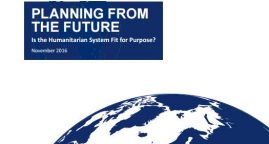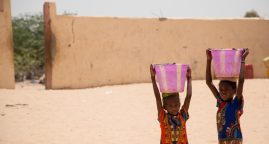Malteser International : Over five million people face starvation in South Sudan
Article published on The Sovereign Order of Malta website on 06/21/2017.
The number of people estimated in need of humanitarian assistance has increased to over 5 million – almost half of the population of South Sudan – out of which 100,000 are facing famine conditions due to civil conflict and a collapsing economy in South Sudan. Following a fact finding tour last week to assess the current situation and needs, president of Malteser International Europe Douglas Saurma-Jeltsch announced increased funding for the stricken populations of the region, where Malteser International, the Order of Malta’s worldwide relief agency, has been working for 20 years.
Fighting against malnutrition
Civil conflict and instability has forced tens of thousands of people in the region of Wau, northwest of the capital, Juba to seek safety in camps and settlements. They had to leave behind all their belongings as well as the harvest of the past year and are missing the planting season for 2017, which leads to severe food insecurity in the region.
In the fight against food insecurity, Malteser International is providing free meals to around 3,000 schoolchildren in one of these camps, with a further 2,000 receiving meals at a Malteser International project in Juba. The organization is constructing pumps to supply drinkable water. To help hygiene in the refugee camps, staff also distribute soap to 18.000 people.
“There is profound misery in Wau. The situation is even worse than in Juba. Very many children live on the street. A huge number of people are in great need. It would be easy to allow yourself to become discouraged. But there are people we can reach and help, and we are doing our best for them in every way we can,” says von Saurma-Jeltsch.
Food hygiene is an important health issue
“The food we distribute consists of rice and beans,” he continues. “I tried it yesterday – it tastes very good. National Malteser International staff cooks it, fresh every day, in the local school kitchen. The children line up in long rows. First they have to wash their hands. Hygiene before eating is a very important health issue, especially in South Sudan. That is why we are investing not only in the food, but also in hygienic measures to prevent further outbreaks of cholera and other diseases. Hand washing and eating always go very close together.”
Only with peace can something new arise
“What it is clear – not just to me – is that peace must prevail in this country. The civil war must cease, because it is only on the basis of peace that something new can arise. Whatever action is taken here, as long as there is no peace, everything else is very temporary. To this extent, it is the desire and hope of the people in South Sudan that a solution can also be found through the international community.”
Related Articles
Planning from the future : Is the Humanitarian System Fit for Purpose?
02/01/2017. Is the Humanitarian System Fit for Purpose?
Fact-checking John Kerry’s speech on the Israeli-Palestinian conflict
03/01/2017. “It’s important to note that every United States administration, Republican and Democratic, has opposed settlements as contrary to the prospects for peace.” Secretary of State John F. Kerry.
The “New Way of Working”: Bridging aid’s funding divide
06/09/2017. The so-called New Way of Working (NWOW) has, according to its champions, the potential to radically improve how emergency relief programmes are designed and delivered.






